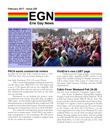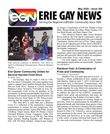Report: Hostile Laws & Lack of LGBT Protections Leave Trans People at Risk
Despite recent progress, LGBT people and their families still face legal discrimination
Denver, CO, February 2, 2017 - The lesbian, gay, bisexual and transgender (LGBT) community has seen both significant progress and painful setbacks recently. The 2015 Supreme Court ruling in favor of the freedom to marry was a major step toward legal equality, and there have been many successes since then at the federal, state, and local levels, including increased protections for transgender and gender non-conforming people. However, since the ruling, there have also been more than 200 anti-LGBT bills introduced in 20 states-and a recently leaked executive order draft suggests that the current administration intends to undermine established non-discrimination protections and open the door to a wide range of harms to the LGBT population.
To help make sense of the current policy landscape in the states for LGBT people, and transgender people specifically, the Movement Advancement Project (MAP), in partnership with the National Center for Transgender Equality, today released Mapping Transgender Equality in the United States, a report that looks at legal equality for transgender people across the country. According to the report, 51% of the adult LGBT population in the U.S. live in states with low legal protection for transgender people or have outright hostile laws against transgender people.
"Despite recent gains, we are still far from achieving full legal equality, especially for transgender people," said Ineke Mushovic, executive director of the Movement Advancement Project. "The resounding rejection of North Carolina's HB2 in the court of public opinion should serve as a warning for other states like Texas that are considering similar legislation that singles LGBT people out for discrimination. And with the Trump administration seeking to create a broad license to discriminate order that would gut current federal protections for LGBT people and others, we must protect our gains while continuing to advance critical policies that protect transgender people. The work is far from over."
Mapping Transgender Equality in the United States focuses primarily on legal equality for transgender people and examines the protections states provide based on gender identity. The gender identity tally consists of 25 state laws and policies in the five key categories: Non-Discrimination, LGBT Youth Laws and Policies, Health and Safety, Ability for Transgender People to Correct the Name and Gender Marker on Identity Documents, and Adoption and Parenting. Laws that focus on sexual orientation only, such as marriage or other forms of relationship recognition, are not addressed in the gender identity tally because they are not focused on a person's gender identity or identity as a transgender person.
The report breaks states down into four categories based on their gender identity protections:
- High Equality States: 12 states & D.C. representing 39% of the adult LGBT U.S. population
- Medium Equality States: 7 states representing 9% of the adult LGBT U.S. population
- Low Equality States: 8 states representing 16% of the adult LGBT U.S. population
- Negative Equality States: 23 states representing 35% of the adult LGBT U.S. population
Among the key findings from the report:
- 35% of LGBT people live in states with hostile laws regarding gender identity. This means that in 23 states, transgender people are not protected from bullying and discrimination in schools, cannot access medically necessary health care, often cannot update the name and gender marker on their identification, and can be unfairly fired, evicted, or kicked out of public places.
- Legal protections based on gender identity lag behind protections based on sexual orientation. When looking at sexual orientation protections, no states have a negative tally and 22 states have a low tally. However, on the gender identity tally map, 23 states have a negative tally and a further 8 states have a low tally totaling 31 states with a negative or low tally. This means 51% of LGBT Americans live in states with a hostile or low gender identity tally compared to 36% of LGBT people living in states with a hostile or low sexual orientation tally.
- There are opportunities for progress even in the highest-rated states. 12 states and D.C. have an overall high equality tally for gender identity, but not a single state has high equality ratings across all five categories of protections. In fact, only California and D.C. have high ratings in four out of the five categories.
- California leads the nation. California has the nation's highest level of equality and protections based on gender identity, with a tally of 16 out of a possible 18, while Georgia has the most negative rating at -4.50 out of a lowest possible tally of -6.50.
In this rapidly changing legal landscape, the Movement Advancement Project maintains LGBT Equality Maps, which track LGBT equality, populations, and other data by state. The maps are updated daily as changes in law, policy, and legislation occur. All Equality Maps, including high-resolution JPEG versions, are available for publication. The LGBT Equality Maps allow websites to embed the maps easily and for free. Visit lgbtmap.org/equality-maps to learn more.
Click here to read the report.
Founded in 2006, the Movement Advancement Project is an independent think tank that provides rigorous research, insight and analysis that help speed equality for lesbian, gay, bisexual and transgender people. www.lgbtmap.org




